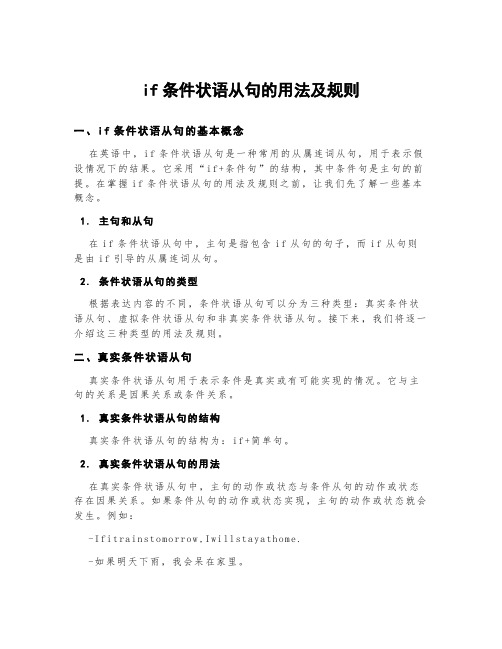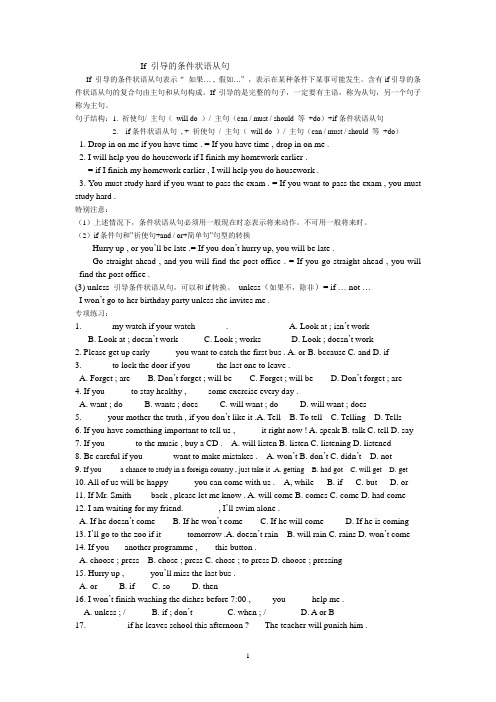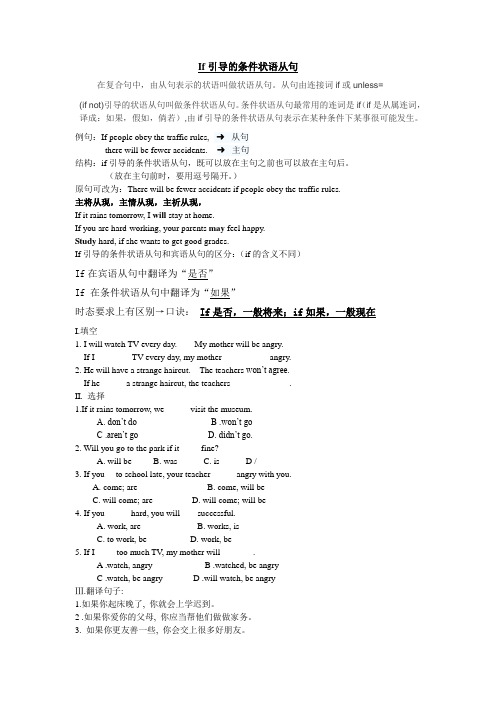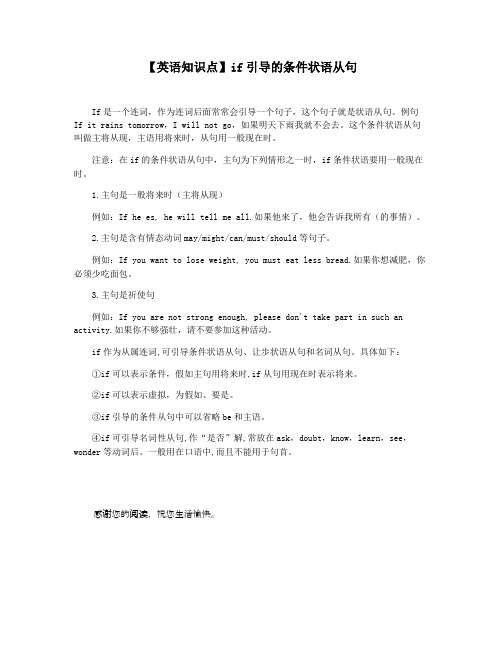if 条件状语从句
if条件状语从句的用法及规则

if条件状语从句的用法及规则一、i f条件状语从句的基本概念在英语中,i f条件状语从句是一种常用的从属连词从句,用于表示假设情况下的结果。
它采用“i f+条件句”的结构,其中条件句是主句的前提。
在掌握i f条件状语从句的用法及规则之前,让我们先了解一些基本概念。
1.主句和从句在i f条件状语从句中,主句是指包含if从句的句子,而i f从句则是由if引导的从属连词从句。
2.条件状语从句的类型根据表达内容的不同,条件状语从句可以分为三种类型:真实条件状语从句、虚拟条件状语从句和非真实条件状语从句。
接下来,我们将逐一介绍这三种类型的用法及规则。
二、真实条件状语从句真实条件状语从句用于表示条件是真实或有可能实现的情况。
它与主句的关系是因果关系或条件关系。
1.真实条件状语从句的结构真实条件状语从句的结构为:if+简单句。
2.真实条件状语从句的用法在真实条件状语从句中,主句的动作或状态与条件从句的动作或状态存在因果关系。
如果条件从句的动作或状态实现,主句的动作或状态就会发生。
例如:-I fi tr ai ns to mo rro w,I wi ll st ay at hom e.-如果明天下雨,我会呆在家里。
上述例句中,条件从句“if it ra in st omo r ro w”表达的是“下雨”的情况,主句“Iw il ls t ay at ho me”表示的是因果关系,即如果明天下雨,我将呆在家里。
三、虚拟条件状语从句虚拟条件状语从句用于表示条件是不真实、不可能实现或对现实进行推测的情况。
1.虚拟条件状语从句的结构虚拟条件状语从句的结构为:if+过去完成时。
2.虚拟条件状语从句的用法在虚拟条件状语从句中,条件从句的动作或状态无法实现,主句的动作或状态也会受到影响。
例如:-I fI ha ds tu di ed har d er,I wo ul dh av epa s se dt he ex am.-如果我学得更努力,我就能通过考试了。
if 引导的条件状语从句

一般现在时。 If you drive too fast, you may have an accident. You must stop if the traffic is red. If you finish the homework, you can go home. 如果你作业做完了就可以回家了。 If you want to lose weight you must/should eat less bread. 如果你想减肥,你必须少吃面包。
if引导的条件状语从句
If条件句:条件句用于陈述语气,表示将来的可能性,能力, 允
诺,命令,要求,请求,建议时,假设的情况可能发生,其中 if 是“假如, 如果”的意思。主句一般将来时 ,从句用一般现在时。
运用“主将从现”的原则。
构 成
条件从句
主句
时 态
If+一般现在时 主语+shall/will+动词原形
if引导的条件状语从句
主从句的时态?
If I get up late, I will be late for school. If I don’t finish my homework, I won’t go to bed. If you join the band(乐队), you will be famous.
• 除非天气不好,我每天早晨都要去散步。
• 3. I won‘t loan you unless you are in extreme need of money.
• 若不是你急需用钱,我不会借钱给你的。
if引导的条件状语从句
Summary(小结)
if 条件句不一般, 几个要点记心间; 条件句,放在前, 逗号要放句中间。 条件句表可能, 主将从现不一般; 条件句表事实, 主句常用现在时。
if 条件状语从句

If 引导的条件状语从句If 引导的条件状语从句表示“如果… , 假如…”,表示在某种条件下某事可能发生。
含有if引导的条件状语从句的复合句由主句和从句构成。
If引导的是完整的句子,一定要有主语,称为从句,另一个句子称为主句。
句子结构:1. 祈使句/ 主句(will do )/ 主句(can / must / should 等+do)+if条件状语从句2. if条件状语从句, + 祈使句/ 主句(will do )/ 主句(can / must / should 等+do)1. Drop in on me if you have time . = If you have time , drop in on me .2. I will help you do housework if I finish my homework earlier .= if I finish my homework earlier , I will help you do housework .3. Y ou must study hard if you want to pass the exam . = If you want to pass the exam , you must study hard .特别注意:(1)上述情况下,条件状语从句必须用一般现在时态表示将来动作。
不可用一般将来时。
(2)if条件句和”祈使句+and / or+简单句”句型的转换Hurry up , or you’ll be late .= If you don’t hurry up, you will be late .Go straight ahead , and you will find the post office . = If you go straight ahead , you will find the post office .(3) unless 引导条件状语从句,可以和if转换。
If引导的条件状语从句

If引导的条件状语从句在复合句中,由从句表示的状语叫做状语从句。
从句由连接词if或unless=(if not)引导的状语从句叫做条件状语从句。
条件状语从句最常用的连词是if(if是从属连词,译成:如果,假如,倘若),由if引导的条件状语从句表示在某种条件下某事很可能发生。
例句:If people obey the traffic rules, ➜从句there will be fewer accidents. ➜主句结构:if引导的条件状语从句,既可以放在主句之前也可以放在主句后。
(放在主句前时,要用逗号隔开。
)原句可改为:There will be fewer accidents if people obey the traffic rules.主将从现,主情从现,主祈从现,If it rains tomorrow, I will stay at home.If you are hard-working, your parents may feel happy.Study hard, if she wants to get good grades.If引导的条件状语从句和宾语从句的区分:(if的含义不同)I.填空1. I will watch TV every day. My mother will be angry.If I ________TV every day, my mother _____ _____angry.2. He will have a strange haircut. The teachers won’t agree.If he _____ a strange haircut, the teachers______ _______.II. 选择1.If it rains tomorrow, we _____ visit the museum.A. don’t do B .won’t goC .aren’t go D. didn’t go.2. Will you go to the park if it ____ fine?A. will beB. wasC. is D /3. If you __to school late, your teacher _____ angry with you.A. come; areB. come, will beC. will come; areD. will come; will be4. If you _____ hard, you will ___ successful.A. work, areB. works, isC. to work, beD. work, be5. If I ____ too much TV, my mother will _______.A .watch, angryB .watched, be angryC .watch, be angryD .will watch, be angryⅢ.翻译句子:1.如果你起床晚了, 你就会上学迟到。
【英语知识点】if引导的条件状语从句

【英语知识点】if引导的条件状语从句
If是一个连词,作为连词后面常常会引导一个句子,这个句子就是状语从句。
例句If it rains tomorrow,I will not go,如果明天下雨我就不会去。
这个条件状语从句叫做主将从现,主语用将来时,从句用一般现在时。
注意:在if的条件状语从句中,主句为下列情形之一时,if条件状语要用一般现在时。
1.主句是一般将来时(主将从现)
例如:If he es, he will tell me all.如果他来了,他会告诉我所有(的事情)。
2.主句是含有情态动词may/might/can/must/should等句子。
例如:If you want to lose weight, you must eat less bread.如果你想减肥,你必须少吃面包。
3.主句是祈使句
例如:If you are not strong enough, please don't take part in such an activity.如果你不够强壮,请不要参加这种活动。
if作为从属连词,可引导条件状语从句、让步状语从句和名词从句。
具体如下:
①if可以表示条件,假如主句用将来时,if从句用现在时表示将来。
②if可以表示虚拟,为假如、要是。
③if引导的条件从句中可以省略be和主语。
④if可引导名词性从句,作“是否”解,常放在ask,doubt,know,learn,see,wonder等动词后。
一般用在口语中,而且不能用于句首。
感谢您的阅读,祝您生活愉快。
If引导的条件状语从句知识讲解

2. 借助介词with 或without来转换。
例如: If you help me, I’ll finish my job soon.
W--i-t-h--y--o-u--r--h--e-l-p-, I’ll finish my job soon. 如果你帮我,我将很快完成我的工作。 If there is no water, fish may die.
• 2. 在if引导的条件状语从句中不能够使用some, 而要用any。
• 例如: If you have any questions to ask, please come to my office. 如果你有问题要问的 话,请到我办公室来。
1. if 在句中的含义不同 I want to know if he is a teacher.
3 If she ___d_o_e_s_n_’t_g_e_t____(not get ) up early , she’ll miss the early bus .
3. 时态要求上有区别
1.I want to know if there will be
a
sports meeting next month.
If 引导的宾语从句的时态由主句及本身时
态决定;
2.If it doesn’t rain , we’ll hold it.
If 引导条件状语从句的时态为一般现在时 记住“主将从现”
I won’t go there _____ I _____hear from you. I won’t go to the party if I am not invited. (同义句)
if条件状语从句(精)
什么是条件状语从句・由if引导的从句叫条件状语从句,if意为“如果”。
•当主句是一般将来时时,if引导的从句必须用现在时来表示将来可能发生的动作或存在的状态。
比主将从现Eg: If I get up late, I will be late for school. (从句一般现在时)(主句一般将来时)条件状语从句中,主从句的位置大多数情况下,从句可以位于主句之前,也可以位于主句之后,不过当从句在前时,主从句之间必须用逗号隔开。
女口:If you study hard, you will pass the exam. 如果你努力学习的话,你就会通过考试。
I won't go to school if it rains tomorrow.女口果明天下雨我就不去学校了。
*. . y\ we will goIf it is fine tomorroIfIhaI will travel around the world./f you feel hungry, you shouldeat something.If you feel tired, you musthave a rest./f you are ill, you must goto see a doctor.If you are riding a bike inthe street, you must bevery careful:Team Work•Team 1:If he plays computer games on weekdays , what will happen?•Team 2:If you have a robot, what will you do?If he plays computer■games on weekdays,what will happen?He II be very tired in classHis parents will be sad.He wont get good grades.If you have a robot, “Hat wiHyou do?Examplegl will let it..I pIQy gamescieon my bedroomdo入_miHave a try 用把号内所给词的正确形式填空1 .Tm sure if he goes (go) to the party, hewill have (have) a great time・2.1f the rain stops (stop) tonight, we will go to the cinema. 3」'll buy a computer if I have (have) eno ugh money.4.You won't qet (not get) nervous if you do (do ) enough exercise・5.If she is (be) kind to me , I won't argue (not argue) with her.6」want to know if he comes(C ome) tomorrow, if he_Qomes_(come), I will givp (give) the massage to him. 7」f you (pay) more attention to that, he won't get (not get) injured.。
if 引导条件状语从句
if 引导条件状语从句
摘要:
1.条件状语从句的定义
2.if 引导条件状语从句的语法结构
3.if 引导条件状语从句的用法和实例
正文:
条件状语从句是用来表示一个条件,即如果某个条件成立,那么就会发生某个结果。
在英语中,条件状语从句通常由if 引导。
语法结构:
if + 条件从句(主语+ 谓语+ 其他成分)
主句(主语+ 谓语+ 其他成分)
if 引导条件状语从句的用法和实例:
1.肯定句中的条件状语从句
If it is hot, we will go to the beach.(如果天气热,我们将去海滩。
)
2.否定句中的条件状语从句
If it is not hot, we will go to the park.(如果天气不热,我们将去公园。
)
3.一般疑问句中的条件状语从句
Will you help me if I need your help?(如果我需要你的帮助,你会帮助我吗?)
4.特殊疑问句中的条件状语从句
What will you do if you win the lottery?(如果你中彩票,你会做什么?)
通过以上实例,我们可以看到if 引导条件状语从句在各种句子类型中的用法。
If引导的条件状语从句
编辑课件
4
变换:
1.有if引导的条件状语从句的复合句中,当主句和从句的 主语均为you时,可转换为“祈使句,and+简单句”或
“祈使句,or+简单句”
You can pass the exam if you work hard. Work hard ----------------,and you will pass the exam.
for you , it will be good for your study.
编辑课件
12
5. If you __d_o_n_’_t _w_o_rk___(not work ) hard , you _w_o_n_’_t _p_as_s_(not pass) the exam.
6. If she __m__e_n_d_s_(mend) the computer , her father __w_o_n_’t_b_l_am__e_(not blame ).
W--i-t-h--y--o-u--r--h--e-l-p-, I’ll finish my job soon. 如果你帮我,我将很快完成我的工作。 If there is no water, fish may die.
Fish may die w--i-th--o--u-t--w--a--t-e-r--. 如果没有水,鱼可能会死。
I won’t go there unless I hear from you.(同义 if 句) don’t
I won’t go there _____ I _____hear from you. I won’t go to the party if I am not invited. (同义 句) unless I won’t go to the party_____ I am invited.
if引导的条件状语从句,5个
What is to become of me if you go away?如果你走的话,我的结果将是怎样呢?* he winks at you,you may wink back as well. 如果他向你使眼色的话,你也可以使眼色以示回答。
* you take this medicine,all your symptoms will fall away. 如果你使用这种药物,你的所有症状将会消失。
4.I shall write to you if anything comes up. 如果发生了什么事情我将写信告诉你。
* he is no good, flunk him. 如果他表现不好,给他不及格。
* you cannot do it, I will understand. 如果你不能做这件事,我可以谅解。
* it if you dare. 如果你敢,你就试试看。
8.I will not wear this dress if you object to it. 如果你不喜欢这件衣服,那我就不再穿它了。
* blustered out what she would do if she caught me. 她恫吓说,如果她抓住我,她会怎么办。
* you grasp this rope, I will pull you up. 如果你抓住这根绳子,我可把你拉起来。
- 1、下载文档前请自行甄别文档内容的完整性,平台不提供额外的编辑、内容补充、找答案等附加服务。
- 2、"仅部分预览"的文档,不可在线预览部分如存在完整性等问题,可反馈申请退款(可完整预览的文档不适用该条件!)。
- 3、如文档侵犯您的权益,请联系客服反馈,我们会尽快为您处理(人工客服工作时间:9:00-18:30)。
If he studies hard, he will go to Beijing University.
He will go to Beijing University if he studies hard.
If I, go to the zoo
will see the elephant show
Tom likes watching TV very much.
If he watches TV too late ,he will…
be tired
If he is tired ,he won’t…
listen to the teacher carefully in class
If he doesn’t listen to the teacher carefully in class ,he won’t…
If she is happy ,swhat will they do ?
If they are happy ,they will…
What will happen if I touch it?
cry
get angry get excited be happy
is sunny tomorrow, they _____ will If it ____ ______ take a trip.
He won’t study hard.
He will fail in the exam.
If he doesn’t _______ study hard,he ____ will _____ fail in the exam.”
if 引导的条件状语从句 (Conditional Sentences)
To use the conditional sentences correctly
Fill in the blanks.
can If you ____ visit People’s Square, you ___ also ___ see famous buildings around it,
词组: one of ….. , in the centre of…., a public area, such as, light up, across the Huangpu River 单词拼写: sightseeing, modern, centre, building, across 单选:CBDBC 完成句子: 1. is fine, will go 2. places of interest 3. in the centre of
If you touch(触,碰) it, it will ______
There will be a party tonight. I’ll go to a party.
What will happen … ?
I think I’ll go to the party with my friend.
many old buildings.
go will see If you ____ along the Bund, you ______ walk Ready?
If you enjoy ____ history and natural beauty, you _______ will love this garden.
Part B a. if you put it in the fridge. b. if her car doesn’t work. c. you can eat delicious food. d. I can go to the concert. e. if you wear your glasses. f. we won’t be able to go skiing.
It is going to rain tomorrow.
I will stay at home.
rains tomorrow, I _____ will _____ stay at home. If it _____
It will be sunny tomorrow.
They will take a trip tomorrow.
用 (用/不 用) 当if引导的从句放在主句前时,___ 逗号隔开两个句子; 不用 当if引导的从句放在主句后时,则 __(用/不用)
逗号隔开两个句子;
She is going to walk to school.
She will be late.
will ___late. be If she walks _____ to school, she _____
The candle burns if you light it.=If you light it, the candle burns. ___________________
3. I will build many schools for the poor children if I win a billion dollars. ____________________________________ 4. My uncle visits the school if he will have time.
If I go to the zoo, I will see the elephant show. I will see the elephant show if I go to the zoo.
If it, fine tomorrow,
will we, go on a school trip
If it is fine tomorrow, we will go on a school trip
get good marks
Let’s look at another story about Sally.
Sally goes to bed early at night.
If she goes to bed early, she will…
be full of energy(精力充沛的)
If she is full of energy in class, she will…
We will go on a school trip if it is fine tomorrow
will If we, have a barbecue we, have, a lot of, delicious food
If we have a barbecue, we will have a lot of delicious food. We will have a lot of delicious food if we have a barbecue.
Conditional sentences
The If-clause talks about a if 从句一般现在时 possible action the simple present tense
If you walk along the bund, you will see many old buildings.
If we, go to the beach
can we, make sandcastles
If we go to the beach, we can make sandcastles. We can make sandcastles if we go to the beach.
If she, want to go to Pudong,
If you, visit, Tokyo,
can you, go shopping, in large shops
If you visit Tokyo, you can go shopping in large shops. You can go shopping in large shops if you visit Tokyo.
If you wear jeans to the party, the teacher won’t let you in.
What will happen … ?
I think I’ll take the bus to the party. (be late)
If you take the bus to the party, you’ll be late.
If we have good living habits, we’ll live better in the future.
一、请判断下面句子的正误,如果有误,请在后面的横线上更正。 1. If you will do more exercise this summer, you will be very will do → do fit. ___________________ 2. The candle burns, x if you light it.
listen to the teacher carefully
If she listens to the teacher carefully in class ,she will…
get good marks
What can you learn from the two stories?
从这两个故事里,你能学到什么? Using if sentences
.
If she, eat too much
will be very fat
If she eats too much,she will be very fat. she will be very fat if she eats too much.
If he, study hard
will go to Beijing University
